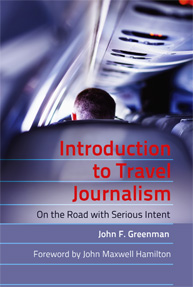The road or roadless to adventure
Posted: November 5, 2012 Contents: Chapter 3 | Tags: adventure journalism, adventure writing, avery stonich, backcountry, outdoor industry association, road trip, roadless areas, travel adventure, travel journalism, travel research, travel writer, travel writing Leave a comment »Chapter 3 introduces adventure as an important niche topic for travel readers. Earlier this month, adventure travelers and consequently adventure writers received good news when the Supreme Court ignored a ruling that would allow individual states to downgrade protection on roadless(backcountry areas that have few roads or significant alterations other than trails) areas that may allow things like mining and deforestation in certain outdoor adventure areas. Avery Stonich of Outdoor Industry Association calls this effort or lack of a
major win, protecting these places for future generations.
Without these roadless areas there would be very little for the adventure audience to read about.
More to blogging
Posted: November 5, 2012 Contents: Chapter 5 | Tags: duct tape marketing, ducttapemarketing.com, john jantsch, search engine optimization, seo, travel blog, travel journalism, travel journalist, travel technology, travel writing Leave a comment »Getting published is no longer just about sending letters to magazine and newspaper editors. According to John Jantsch, an author and contributor at ducttapemarketing.com, blogging isn’t enough anymore either. Jantsch offers this advice on how to have an easily accessible optimized blog:
I believe the best approach currently and in the foreseeable future calls for a 2-prong strategy to content development that feeds both readers and spiders. I believe that we must create what I’m calling classes of content that address the growing demand for real-time updates and long-term sustainability. When I talk about classes I’m talking about how we build, display, link to and optimize our content. I believe we need develop content strategies along these two classes: attraction content and foundation content
A step ahead of the stomach ache
Posted: November 5, 2012 Contents: Chapter 4 | Tags: budget travel, budgettravel.com, Fran Golden, stay healthy while traveling, travel health, travel journalism, travel research, travel safety, travel sickness, travel tips, travel writer, travel writing Leave a comment »Chapter 4 offers brief advice on how to stay healthy while traveling. Budgettravel.com‘s Fran Golden offers similar advice coaching travelers on how to keep their stomach safe while traveling. Golden offers a few tips every traveler can remember to avoid being apart of the 50 percent of travelers that receive some type of stomach sickness while abroad, he advises:
- One easy rule of thumb: If your lodgings don’t allow you to flush toilet paper, don’t drink the water. It’s a sign you’re visiting a region with an unsafe water supply.
- As for food, “Boil it, peel it, or forget it” has been the standard recommendation. Make sure food is served piping hot. If it’s been left out to cool, it could be harboring a growing colony of bacteria.
- Fly from flies. Never eat food that isn’t protected from insects, which can contaminate even freshly cooked…
Indie tour guide
Posted: November 5, 2012 Contents: Chapter 6 | Tags: eileen smith, indie tour guide, matador network, matadornetwork.com, tour guide, travel journalism, travel research, travel writing, vayable, vayable.com Leave a comment »Chapter 6 discusses opportunities as a entrepreneurial travel journalist. Eileen Smith of the Matador Network encourages the travel journalist to make easy cash as an indie tour guide. Smith tells writers to “Monetize your expertise” and show travelers what your city is really like. Getting started is easy as signing up at vayable.com. Smith offers this:
It’s got a couchsurfery-element to it, but instead of giving your couch, you give expertise (for a price you set) while leading tours around where you live, taking people to secret haunts, hikes, or whatever it is you do wherever you are. All you do to get started is upload a picture and description of the service you offer, and wait for people to take you up on it. Afterwards, feedback (called “vouching” on the site) is key, as most people won’t want to spend…
Travel writer as an Orwellian
Posted: November 5, 2012 Contents: Resources | Tags: aaron hamburger, freelance journalists, matador network, matadornetwork.com, orwellian, travel advice, travel journalism, travel writer, travel writing 2 Comments »Resources offers advice from 100 freelance journalists. Aaron Hamburger from the Matador Network offers this: Be an Orwellian. Here’s a tidbit from Hamburger’s article:
Orwell’s prime enemy was vagueness, dullness, and cliché. In his formulation, either you’re choosing language or language chooses you. Or as Orwell puts it: ‘Modern writing at its worst does not consist of picking out words for the sake of their meaning and inventing images to make their meaning clearer. It consists of gumming together long strips of words which have already been set in order by somebody else.’
